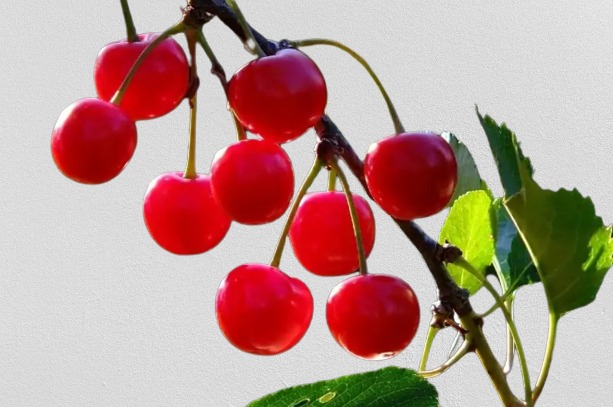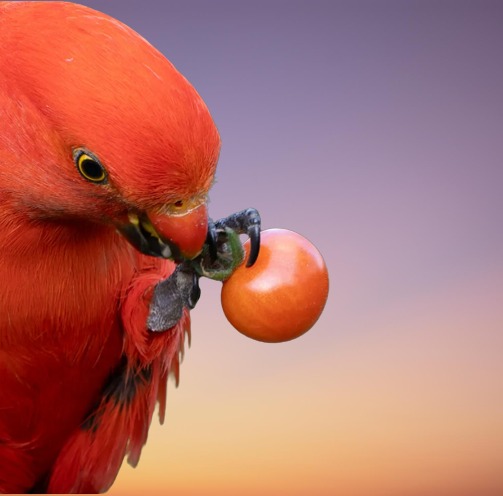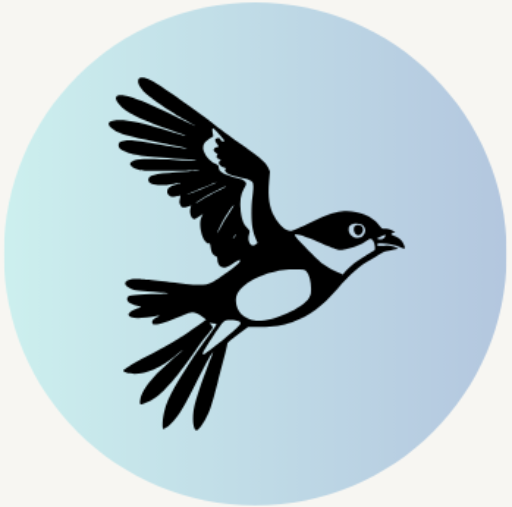Can Parrots Eat Cherries? Yes, parrots can securely eat cherries, however, provided that you reject the pit! We should take a gander at how cherries can help your bird and why the pits are never ok for them to have. Cherry pits frequently contain hints of cyanide and are profoundly harmful to parrots, so you ought to never take care of them for your pet bird.

With their lovely tones, insight, and fun characters, parrots are famous pet decisions. They can likewise be a lot of work! A piece of that work is ensuring they’re eating an even eating regimen. Many parrots love leafy foods, yet which ones are best for them to eat? Your bird will probably appreciate eating a large number of the same things that you eat. Parrots are omnivores and like eating various food sources.
Can Parrots Eat Cherries? What Does a Parrot’s Eating Routine Resemble?
Parrots keep an alternate eating routine containing natural items, vegetables, seeds, nuts, and pellets. It’s essential to offer different food assortments to ensure that Parrots Eat Cherries can get all of the major enhancements. Incorporating cherries into a parrot’s eating routine can give a scrumptious and nutritious development, adding to their overall prosperity and thriving.
Health Benefits of Cherries:
Cherries gloat a variety of supplements that can emphatically influence a parrot’s well-being. With nutrients C, K, and B6, Parrots Eat Cherries can uphold invulnerable capability, blood thickening, and energy digestion. Moreover, cherries contain cancer prevention agents like anthocyanins, which assist with shielding cells from harm brought about by free extremists, upgrading Parrots Eat Cherries’ general imperativeness.

Are Cherries Ever Hazardous for Parrots?
While cherries offer various medical advantages, practicing caution is pivotal. The pits of cherries contain cyanide compounds, possibly harmful whenever ingested unnecessarily. Consequently, it’s crucial to eliminate pits before Parrots Eat Cherries. Moreover, settle on natural cherries to limit openness to pesticides and synthetic compounds that might hurt parrot wellbeing.
What is the Dietary benefit of Cherries?
Cherries are low in calories but high in fundamental supplements, making them an optimal nibble for parrots. With nutrients A, C, and K, as well as minerals that prefer potassium, manganese, and copper, cherries offer a healthful lift to Parrots Eat Cherries’ general prosperity. Remembering cherries for a decent eating regimen assists meet Parrots With eating Cherries’ dietary necessities.
The most effective method to Serve Cherries to Parrots to Forestall Wreck:
To limit wreck and guarantee safe utilization, there are a few serving strategies for Parrots Eat Cherries. Offer cherries in little, reduced-down pieces to forestall stifling dangers and make them simpler for Parrots Eat Cherries to eat. Eliminating pits in advance and giving cherries in a bowl or pierced on a bird-safe stick can likewise limit wreck and waste.

What Will Occur if a Parrot Eats a Cherry Pit?
Coincidental ingestion of a cherry pit can prompt gastrointestinal issues or cyanide harming in Parrots Eat Cherries. Side effects might incorporate spewing, runs, trouble breathing, and shortcomings. If you suspect Parrots Eat Cherries have consumed a pit or show surprising conduct in the wake of consuming cherries, look for guaranteed veterinary consideration.
Could Parrots Have Cherry Juice?
While cherry juice might appear to be advantageous, it’s ideal to try not to offer it to Parrots Eat Cherries. Most industrially accessible cherry juices contain added sugars and additives, possibly unsafe for parrot wellbeing. Also, the concentrated idea of cherry juice might give a lot of sugar and calories for Parrots Eat Cherries, prompting heftiness and medical problems.
Will Parrots Eat Dried Cherries?
Dried cherries can be given to Parrots Eat Cherries as an infrequent treat, however, balance is critical. Dried cherries are higher in sugar and calories because of water expulsion. Limit how much dried cherries to forestall weight gain and medical problems related to unreasonable sugar consumption in Parrots Eat Cherries.
Would You Like to Impart Human Food to Your Parrot?
While sharing human food might be enticing, not all are right for Parrots to Eat Cherries. A few food varieties like chocolate, avocado, caffeine, and liquor can be poisonous to Parrots Eat Cherries and ought to stay away from them. Continuously research and counsel a veterinarian before acquiring new food sources with Parrots Eat Cherries to guarantee their security and prosperity.
Safety Precautions: Risks and Concerns of Parrots Eating Cherries:
As an expert in parrot care, it’s significant to comprehend the likely dangers and concerns related to taking care of cherries to our padded companions. While cherries offer wholesome advantages, there are security safeguards that parrot proprietors should know about to guarantee the prosperity of their avian friends.
Cyanide Content in Cherry Pits:
One of the fundamental stresses over parrots eating cherries is the presence of cyanide in the pits. Cyanide is a noxious compound that can be damaging at whatever point ingested in immense sums.
Parrots may incidentally consume cherry pits while partaking in the organic product, prompting potential unexpected issues. As mindful guardians, eliminating the pits before offering cherries to our parrots to forestall any antagonistic effects is fundamental.
Pesticide Exposure:
Another worry is the expected openness to pesticides and synthetics utilized in cherry development. Non-natural cherries might contain buildups of pesticides that can be unsafe for parrots whenever ingested. To limit the gamble of pesticide openness, pick natural cherries whenever the situation allows.
Washing cherries completely before offering them to parrots can likewise assist remove any surfacing deposits, guaranteeing a more secure feasting experience for our padded friends.
Digestive Issues:
Parrots might encounter stomach-related issues assuming that they consume cherries in exorbitant sums. While cherries are a heavenly and nutritious treat, overindulgence can prompt stomach-related upset, including runs or spewing.
It’s crucial to offer cherries to parrots with some restriction and as an element of a good eating schedule that integrates different regular items, vegetables, seeds, and pellets.
Looking at your parrot’s use and seeing any movements in their approach to acting or droppings can help recognize and determine any stomach-related issues rapidly.
Allergic Reactions:
A few parrots might be oversensitive to cherries or foster aversions to specific parts tracked down in the natural product. Indications of hypersensitive responses in parrots might incorporate tingling, expanding, or respiratory issues.
If you notice any strange side effects in the wake of taking care of cherries to your parrot, cease offering them and talk with an avian veterinarian for additional direction. Focus on your parrot’s singular dietary inclinations and aversions must guarantee their security and prosperity.
FAQS
Can I give my parrot a cherry?
Cut-up natural products from the rose family (apples, apricots, cherries, nectarines, peaches, pears, and plums) are sound and scrumptious bird-endorsed treats, however, the seeds and pits are poisonous, containing follow measures of a compound that can be risky for your bird’s heart capabilities.
Are birds allergic to cherries?
Most birds love fruit, and most fruit is safe for birds. Be that as it may, when offered specific organic products with seeds (like apples and pears) and pits (like cherries, apricots, peaches, nectarines, and plums), birds ought to never be permitted to eat the seeds and pits, as they contain limited quantities of cardio-poisonous cyanide.
What fruits are safe for parrots?
Fruit and Vegetables – all fresh fruit and vegetables are for the most part alright for parrot utilization however the most loved ones we have found are carrots, beetroot, peas, sweetcorn, apples, bananas, grapes, oranges, papaya, and pomegranates.
Are cherries toxic to animals?
However, their pit, leaves, and stems all contain cyanide, which is poisonous to canines. Be cautious that your canine doesn’t eat these pieces of a cherry. At the point when the pit, leaves, and stem are taken out, new cherries are totally fine for sound young doggies and grown-up canines — in little divides.
Why do birds like cherries?
The principal justification for why birds are eating your yields is because it’s a simple and sweet food source. Rather than having birds feed on your delectable cherries, consider taking care of them with a couple of other berry-delivering plants.
Conclusion
Parrots can securely appreciate cherries. The tissue and the skin can be delicious treats for your bird and proposition many advantages to their wellbeing. To keep your parrot the best that they can be, offer new or dried cherries as a component of an even eating regimen that incorporates pellets, vegetables, nuts, and other natural products. Avoid sulfur dioxide as a fixing in dried cherries.
New cherries have pits that contain cyanogenic glucosides, which can be poisonous to parrots. Hence, cherry pits should be eliminated before your bird can partake in this helpful bite. It is critical to continuously wash the cherries before offering them to your parrot, to eliminate any contaminations or pesticides.
Latest Post
Discovering Parrot Nutrition: What Do Parrots Eat for Optimal Health?
